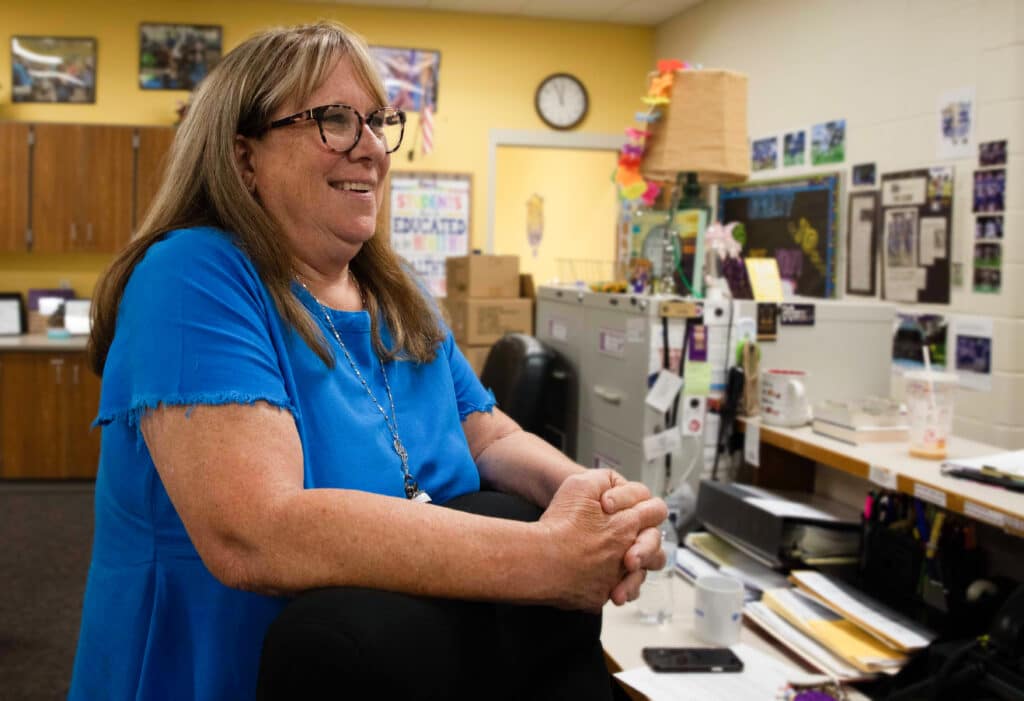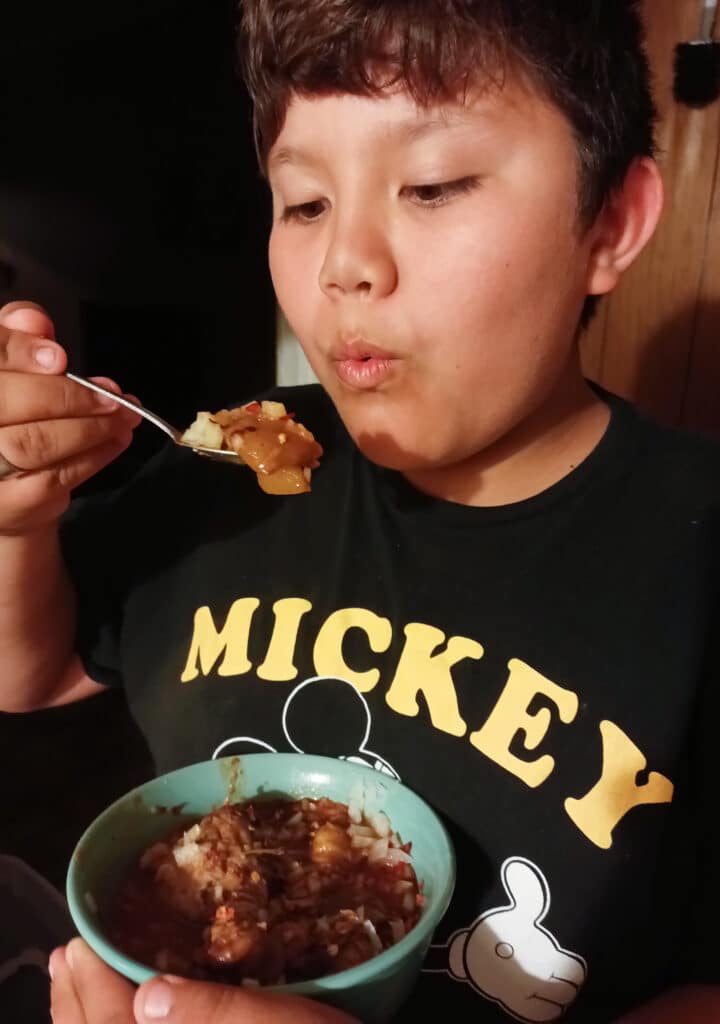In 2021, approximately 17% of residents in Logan County were categorized as food insecure. In Arkansas, food insecurity has been a persistent struggle for decades. Currently, 1 in 6 Arkansas residents experience hunger due to food insecurity.
RAQUEL ARAMBULA
Booneville, Arkansas
Dragon fruit. “It’s a little bit expensive” states Raquel, but when scooped out of its pink, scaly skin, the white flesh is sweet and creamy. On a hot summer day, it's a healthy and refreshing snack, perfect for a picnic in the park or a long day at the lake fishing. Raquel’s 10-year-old son Ernesto recently discovered the fruit. It was the first he chose when allowed to pick fruits and vegetables from the local supermarket with his mother.

Dragon fruit. “It’s a little bit expensive” states Raquel, but when scooped out of its pink, scaly skin, the white flesh is sweet and creamy. On a hot summer day, it's a healthy and refreshing snack, perfect for a picnic in the park or a long day at the lake fishing. Raquel’s 10-year-old son Ernesto recently discovered the fruit. It was the first he chose when allowed to pick fruits and vegetables from the local supermarket with his mother.
Shopping together and discovering new produce has been afforded by Raquel’s participation in a new initiative known as Vouchers for Veggies – provided by Program Manager Lucy Ray who runs the health clinic at Ernesto’s school. Vouchers for Veggies is a valuable tool that Raquel hopes will allow them to lead a healthier life.
It’s common knowledge that regularly eating fruits and vegetables can help protect us against cancer, diabetes, heart disease, and other physical health problems.
The food we eat shapes our bodies. But the process of purchasing, preparing, and eating a meal can also transform our relations to one another. Food has the power to bring us together in ways that positively benefit our mental health and social well-being. But in Booneville, Arkansas – and other places throughout the United States – many folks like Raquel and her son experience food insecurity. Healthy food is either too far away to access or too expensive to regularly purchase.
The food we eat shapes our bodies. But the process of purchasing, preparing, and eating a meal can also transform our relations to one another. Food has the power to bring us together in ways that positively benefit our mental health and social well-being. But in Booneville, Arkansas – and other places throughout the United States – many folks like Raquel and her son experience food insecurity. Healthy food is either too far away to access or too expensive to regularly purchase.
Booneville is a small city located in predominantly rural Logan County, Arkansas. It sits in the fertile Arkansas River Valley between the rolling peaks of the Quachita and Ozark Mountains. Around 4,000 residents call Booneville home.

In 2021, approximately 17% of residents in Logan County were categorized as food insecure. In Arkansas, food insecurity has been a persistent struggle for decades. Currently, 1 in 6 Arkansas residents experience hunger due to food insecurity.
In 2021, approximately 17% of residents in Logan County were categorized as food insecure. In Arkansas, food insecurity has been a persistent struggle for decades. Currently, 1 in 6 Arkansas residents experience hunger due to food insecurity.
Booneville is a small city located in predominantly rural Logan County, Arkansas. It sits in the fertile Arkansas River Valley between the rolling peaks of the Quachita and Ozark Mountains. Around 4,000 residents call Booneville home.
In 2021, approximately 17% of residents in Logan County were categorized as food insecure. In Arkansas, food insecurity has been a persistent struggle for decades. Currently, 1 in 6 Arkansas residents experience hunger due to food insecurity.
While Lucy Ray’s last child was in high school, she attended college full-time to become a teacher. But today, rather than leading in a classroom, Lucy finds herself contributing to the health and well-being of students in a different way.

Lucy works as the Program Coordinator for Bearcat Care Center, an onsite healthcare facility for students and staff of the Booneville Public School District.
For rural communities, school-based health centers afford residents increased access to preventative health services. This approach can have a major impact on the well-being of children and their families, who in some cases lack access to services elsewhere. In a typical school year, the Bearcat Care Center sees 1,610 patients for medical, dental, and optometry health needs.
After starting at the clinic, Lucy quickly identified food insecurity as a problem. Both students and staff oftentimes lack the ability to access healthy food. So she went looking for help.
That’s when Lucy met Communities Unlimited Healthy Foods Coordinator Brenda Williams, who informed her about a new pilot program being offered by CU.
After starting at the clinic, Lucy quickly identified food insecurity as a problem. Both students and staff oftentimes lack the ability to access healthy food. So she went looking for help.
That’s when Lucy met Communities Unlimited Healthy Foods Coordinator Brenda Williams, who informed her about a new pilot program being offered by CU.
With grant money received from the organization No Kid Hungry, which funds initiatives to decrease food insecurity across the country, CU partnered with the Bearcat Care Center to implement the Vouchers for Veggies program. Lucy invited families of students and staff who’ve experienced physical and health issues related to diet or food insecurity to participate.
Through Vouchers for Veggies, participating families are offered $80 gift cards monthly. The gift cards can be spent on fresh fruits and vegetables for the duration of the 6-month pilot program.
Most program participants struggle with chronic health conditions such as high blood pressure, obesity, or diabetes. To remain in the program, each must attend monthly check-ins, where they take part in surveys and measure their biometrics.
Through Vouchers for Veggies, participating families are offered $80 gift cards monthly. The gift cards can be spent on fresh fruits and vegetables for the duration of the 6-month pilot program.
Most program participants struggle with chronic health conditions such as high blood pressure, obesity, or diabetes. To remain in the program, each must attend monthly check-ins, where they take part in surveys and measure their biometrics.
Through Vouchers for Veggies, participating families are offered $80 gift cards monthly. The gift cards can be spent on fresh fruits and vegetables for the duration of the 6-month pilot program.
Most program participants struggle with chronic health conditions such as high blood pressure, obesity, or diabetes. To remain in the program, each must attend monthly check-ins, where they take part in surveys and measure their biometrics.
Lucy developed a questionnaire to gather participant feedback about the program. She also took the initiative to create recipes, nutrition tips, and a cookbook to further support participants and their families.
In all, 50 Booneville Elementary families signed up for the program.
Lucy developed a questionnaire to gather participant feedback about the program. She also took the initiative to create recipes, nutrition tips, and a cookbook to further support participants and their families.
In all, 50 Booneville Elementary families signed up for the program.
"At first I thought, ‘I might be able to get 25 to sign up’ – I just didn’t know. But we had a tremendous response."
–Lucy Ray
Participant photos provided by Lucy Ray.
Line Coach for the Booneville Bearcats football team, Jacob Hattabaugh is also a parent of 4-year-old twins. As a coach, Jacob understands how the food we eat affects our bodies. Eating healthy helps us physically perform at our best on the field. But Jacob also acknowledges that for many of his players – as well as his own family – eating healthy is expensive. It’s cheaper and often more convenient to swing by a drive-through after a long day at school followed by football practice. So Jacob eagerly jumped on the opportunity to join the Vouchers for Veggies program.
“I was just scrolling through [an email] during my period in class and I seen it and I was like, ‘You know, that seems like something that my family could really use because we're spending quite a bit of money on fruits and vegetables right now.’ And the boys can't get enough of them. I told my wife, she's like, ‘You're crazy if you don't do it, so just try it.’”
“I was just scrolling through [an email] during my period in class and I seen it and I was like, ‘You know, that seems like something that my family could really use because we're spending quite a bit of money on fruits and vegetables right now.’ And the boys can't get enough of them. I told my wife, she's like, ‘You're crazy if you don't do it, so just try it.’”
Line Coach for the Booneville Bearcats football team, Jacob Hattabaugh is also a parent of 4-year-old twins. As a coach, Jacob understands how the food we eat affects our bodies. Eating healthy helps us physically perform at our best on the field. But Jacob also acknowledges that for many of his players – as well as his own family – eating healthy is expensive. It’s cheaper and often more convenient to swing by a drive-through after a long day at school followed by football practice. So Jacob eagerly jumped on the opportunity to join the Vouchers for Veggies program.
“I was just scrolling through [an email] during my period in class and I seen it and I was like, ‘You know, that seems like something that my family could really use because we're spending quite a bit of money on fruits and vegetables right now.’ And the boys can't get enough of them. I told my wife, she's like, ‘You're crazy if you don't do it, so just try it.’”
Raquel became concerned about Ernesto’s health after a routine check-up at the Bearcat Care Center revealed his liver was enlarged. So, she eagerly accepted an invite from Lucy to participate in the Vouchers for Veggies program. Raquel hoped the vouchers would provide them with regular access to fresh fruits and vegetables that might improve her son’s physical health. But after just a few weeks in the program, Raquel noticed some other benefits.


Raquel's favorite thing to cook is pozole with a salad on top. "It’s chicken with hominy and spices to make it a little spicy. And then you add the radishes, the lettuce, and onion. You can add different green chiles. I do make the hot oil so I involve dry chiles, the oil and the tortillas to make it.”
Both Raquel and Ernesto’s physical health has notably improved, but they also find themselves doing more – together.
Both Raquel and Ernesto’s physical health has notably improved, but they also find themselves doing more – together.
On one trip to the supermarket Ernesto chose a dragon fruit, perhaps for its mythical name or exotic look. But when he took his first bite, the fruit revealed more. “It reminded him of being in Mexico and with his dad”, Raquel fondly recalls. Now, each trip to the supermarket opens a door to discover new varieties of fruits and vegetables – but also to form deeper connections with one another and their cultural roots.
Ernesto appreciates food more when he has the opportunity to prepare it with his own hands, and learning to use Mexican ingredients when preparing dishes has allowed them both to connect with significant people and places far away from Booneville. “I like helping cook, because it’s like a game with my mom. It makes me happy. And I know when I help my mom, she’ll take me fishing.”
On one trip to the supermarket Ernesto chose a dragon fruit, perhaps for its mythical name or exotic look. But when he took his first bite, the fruit revealed more. “It reminded him of being in Mexico and with his dad”, Raquel fondly recalls. Now, each trip to the supermarket opens a door to discover new varieties of fruits and vegetables – but also to form deeper connections with one another and their cultural roots.
Ernesto appreciates food more when he has the opportunity to prepare it with his own hands, and learning to use Mexican ingredients when preparing dishes has allowed them both to connect with significant people and places far away from Booneville. “I like helping cook, because it’s like like a game with my mom. It makes me like, more happy. And I know when I help my mom, she’ll take me fishing.”
Published 2024


